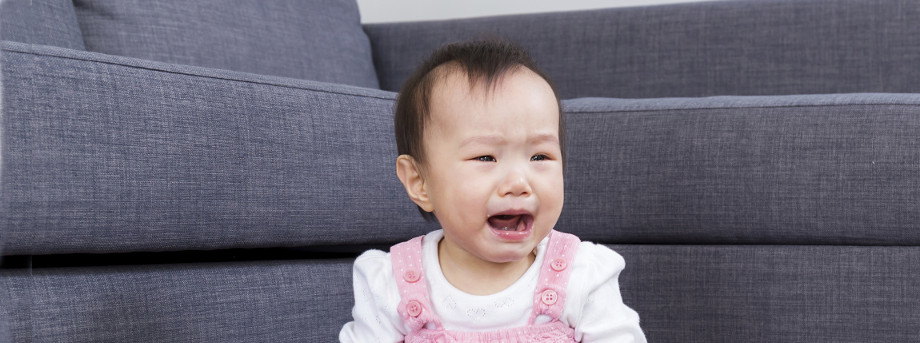The University of Nottingham
 Exchange online
Exchange online
Research Exchange
Children’s falls linked to parents’ safety behaviour, study finds

December 3 2014
Parents of children who fell at home were more likely not to use safety gates and not to have taught their children rules about climbing on things in the kitchen, a study from researchers at The University of Nottingham has found.
In the UK, more than 200,000 under-fives attend emergency departments (ED) and in England more than 20,000 are admitted to hospital each year following a fall. Most of these incidents involved falls from beds, chairs, baby walkers, bouncers, changing tables and high chairs.
Denise Kendrick, Professor of Primary Care Research, in the University’s School of Medicine, led the research which has been published online by JAMA Pediatrics and funded by the National Institute for Health Research (NIHR).
Professor Kendrick said: “Falls from furniture are common in the under-fives and few studies have measured the risk associated with various safety behaviours and items of safety or nursery equipment. Children develop and learn to do new things very quickly. It is important to anticipate what a child is likely to be able to do in the near future and adapt the home to suit them. Children don’t always use furniture as it is intended to be used — they can pull out drawers and climb on them, and even young babies may wriggle off a bed or raised surface if left there.
“Our findings suggest some falls may be prevented by using safety gates across doorways and on stairs and by not leaving children on raised surfaces, not placing car seats or bouncing cradles on raised surfaces and not changing nappies on raised surfaces. Teaching children rules about not climbing on objects may also help, but it is important to make sure children understand rules and for parents to feel confident that children will comply with them before they rely on them as a way of preventing injuries.”
Professor Kendrick and colleagues aimed to examine the potential connections between modifiable risk and falls from furniture by young children. The study involved 672 children — recruited from hospitals in Nottingham, Bristol, Newcastle-upon-Tyne, Norwich, Gateshead, Derby and Great Yarmouth — up to the age of four with falls from furniture who ended up in the ED, admitted to the hospital or treated in another setting.
The study also included 2,648 control participants of the same age without a medically attended fall on the date of another child’s injury.
The results revealed that in most of the cases, the children sustained single injuries (86 per cent); the most common were bangs on the head (59 per cent), cuts and grazes not requiring stitches (19 per cent) and fractures (14 per cent). Most cases (60 per cent) were seen and examined but did not require treatment; 29 per cent were treated in the ED, seven per cent were treated and discharged with follow-up appointments, and four per cent were admitted to the hospital.
Parents of children who fell were more likely than the parents of control participants to not use safety gates and not have taught their children rules about climbing on objects in the kitchen. Children (up to one year of age) who fell were more likely to have been left on raised surfaces, had their nappies changed on raised surfaces and been put in car/bouncing seats on raised surfaces. Children three years and older who fell were more likely to have played or climbed on furniture.
“If our estimated associations are causal, some falls from furniture may be prevented by incorporating fall-prevention advice into child health surveillance programs, personal child health records, home safety assessments and other child health contacts. Larger studies are required to assess association between use of bunk beds, baby walkers, playpens, stationary activity centres and falls,” the study concluded.
Tags: Children’s falls, emergency departments, falls from furniture, injury, JAMA Pediatrics, National Institute for Health Research, Primary Care Research, Professor Denise Kendrick, research, safety behaviours
Leave a Reply
Other News

Top prize for quantum physicist
A University of Nottingham physicist has won a prestigious medal from the Institute of Physics for […]

Zero carbon HOUSE designed and built by students comes home
Design and construct a low cost, zero carbon, family starter home, transport it to Spain, build […]